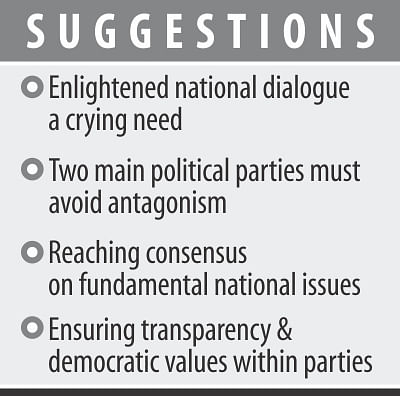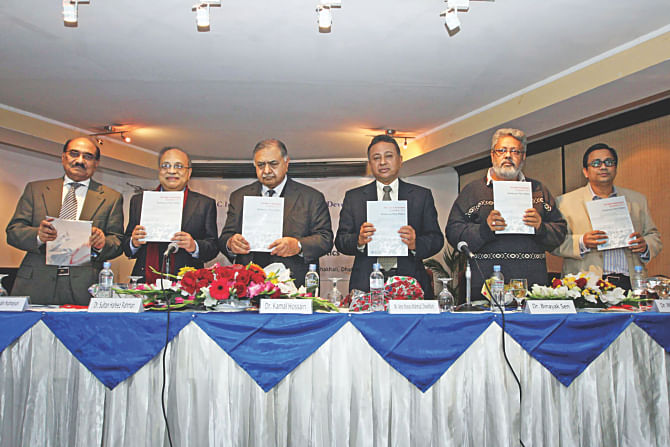Bangladesh faces democracy deficit
Bangladesh faces democracy deficit
Study shows political parties' tendency to exert influence on govt, non-govt bodies

Over a span of three decades, Bangladesh's multi-party democracy has turned into “partyarchy”, a tendency of political parties to exert overwhelming influence on state and non-state institutions.
It has resulted in a downslide in the rule of law, democratic accountability and state building -- the three tenets of political development, says a study report on governance.
The report described these developments as “deficit in democracy” and “slow development of pluralism in the practices of democracy”.
The Brac Institute of Governance and Development (BIGD) launched the report titled “State of Governance Bangladesh 2013: Democracy Party Politics” at the Brac Centre Inn in the capital yesterday.
“Despite economic progress, Bangladesh's democratic development has been hampered. It is a matter of serious frustration for the public,” said Dr Sultan Hafeez Rahman, executive director at the BIGD of Brac University.
Democratic development is in crisis globally. But it doesn't mean Bangladesh has any scope for complacency, as “such underdevelopment” poses serious risks for the future, he said.
The study analyses the factors that influenced political underdevelopment, degree of democracy within the two major political parties, and the gap between intent and actual practice within the parties.
PARTYARCHY AND POLITICAL UNDERDEVELOPMENT
As part of the study, the BIGD looked into the activities of the Supreme Court Bar Association (SCBA), the police and union parishad.
“Politicisation of the SCBA leads to corruption and malpractices,” said Dr Minhaj Mahmud, head of research at BIGD, while presenting the report.

SCBA members disrespected the rule of law, resorted to vandalism over political issues, and continued to hold partisan political activities on court premises, he said.
Recruitment in civil administration couldn't be made merit-based, rather civil administration has been politicised with regionalism and political links being the major factors behind it, said Dr Minhaj.
“While civil society in Bangladesh has been able to play an impressive role in expanding public and economic services across the country to help reduce poverty, it has not been able, especially in recent years, to play the original role,” the report says.
Dominant political parties have managed to “capture” civil society organisations that have “diminished” over the years, it adds.
Renowned economist Dr Binayak Sen said Bangladesh's economic growth relied mostly on readymade garment, remittance, agriculture and rural non-farm sectors that involved low-skilled labour.
“These low-skilled people have not been able to demand democracy, while the middle class could not play their role, and they [middle class] benefit from the inequality that persists in society,” he said.
PARTY FINANCING AND TRANSPARENCY
The study found a rise in inclusion of businessmen in major political parties as a means of expanding their financial resources.
Though the major parties claim that membership fee is the main source of their income, they actually rely mostly on donations from the private sector.
“There is significant divergence between what the parties claim as their source of finance and their actual sources,” it said.

DIVERGENCE BETWEEN DEMOCRATIC NORMS AND PRACTICES
The constitution doesn't make any specific mention of the need for transparency and accountability within the parties. Evidence suggests that the central leaders dominate the grassroots leaders and activists, says the report.
In democracy, there is a “crying need” for inclusive and decentralised representation. “Without this, the democratic governance of a country risks descending into authoritarianism,” it said, suggesting constitutional amendments.
RISE IN POLITICAL VIOLENCE
According to the report, such violence increased at a steady rate of 4 percent between 2008 and 2013.
“The ruling party, whichever it is, always outstrips the opposition in terms of perpetrating violence,” said Dr Minhaj.
Moreover, intra-party violence accounts for a large share of overall political violence which, in most cases, is attributed to ruling parties.
“Political culture goes beyond healthy competition and becomes more confrontational whereby differences are sought to be solved in non-democratic manner and that slow political development contributes to more violence,” he said.
The study said, “There is a dire need for the political leaders to rally the party rank and file around their respective ideologies using profound political mobilisation methods that promote liberal thinking, open debate, pluralism and peaceful tactics to achieve political ends.”
Those breaching these principles must be held accountable, it said.
PROFILE OF POLITICIANS
There has been a greater bias towards the induction of businessmen and dynastic aspirants into parliamentary politics, and it is well reflected in attendance of parliament, participation in budget speech and so on, the report says.
Political parties influence the extent to which members perform effectively in parliament. The businessmen and members, who face corruption charges, have lower attendance levels, it said.
WOMEN IN POLITICS
Though quotas were allocated to include women in politics, women's participation in major political parties is abysmally low, according to the report.
“More specifically, women are used primarily for community mobilisation purposes at the grassroots,” it said. The number of women who contested as independent candidates in national elections is surprisingly low.
This trend is related to general gender bias, and also because of preference given to male politicians perceived as being more likely to act as a source of funding, the report said.
Speaking at the launching, Gono Forum President Dr Kamal Hossain suggested a constructive national dialogue that would involve political parties, civil society members, NGOs, human rights organisations and youths.
“We need to have a consensus on certain fundamental issues,” he said, putting emphasis on merit-based recruitment in civil administration, banning of religion-based politics and an improved environment in educational institutions.
Imtiaz Ahmed, professor of international relations at Dhaka University, said the spectre of liberal fascism is haunting the country, and what exists here is electoral authoritarianism.
“Misgovernance has become profitable. You can get promoted and get contracts without the qualifications actually required,” he said.
“You need to come up with a structure where governance is profitable,” Imtiaz said.
Ruling Awami League leader Yusuf Hossain Humayun said if there is to be any dialogue, the BNP has to come up with issues of national interest, not with any conditions.
BNP leader Amir Khasru Mahmud Chowdhury said the present government is not elected by the people. “How is it possible to start a dialogue with this government?” he asked.
Veteran AL leader Suranjit Sengupta said there wouldn't be any economic growth in the absence of good governance.
Asif Nazrul, professor of law at Dhaka University, said the country saw economic growth as a result of an ongoing process, not because of good governance.
“This growth would have been much higher if there was good governance in the country,” he said.